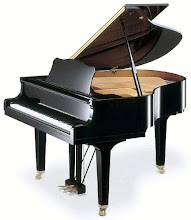This came up while I was writing my debate cases. I had an argument, and I attempted to throw in a million pieces of evidence and analysis. It was a huge two page mess. When my assistant coach took a look at it, he pointed out about 2 sentences that worked. That was all that I had truly said. All of my smoke and mirrors had done nothing but confuse my audience. That proves that more often than not, simplicity is the best option.
Simplicity is shown in everything. We are all made up of a complexity of different things, such as tissues, cells, and proteins. These are further complicated into molecules and atoms. However, the further we get down, the simpler things get. Eventually all matter is broken down into particles called quarks. Very simple, yet because of their simplicity they are able to be built upon.
The same thing happens to me all the time in music. When given a complicated piece of piano music, my piano teaches finds the very simple melody below the blur of notes and haves me practice that over and over. After that is accomplished, I put the next layer of notes on top of that. Eventually, I get the whole thing completed, but only because I had a strong and simple foundation.
Overall, simplicity is the best option because sometimes you don't need to complicate things, and you need a strong foundation to build on.
Tuesday, October 27, 2009
Wednesday, October 21, 2009
A Little Update
To my loyal followers and readers,
I apologize for my lack of a real post this week. My debate has picked up, and I'm trying to meet my many deadlines for both that and piano. I will continue this blog, and post as often as I get ideas for meaningful posts. On a side note, in my English class I am required to post a blog. It will mostly be assignments for that class, but will also have some free writes that might be the same as posts on this blog. If you wish to view it, it is under the Non-blogger Links.
Thank you again for your faithful following of my blog, and I will pick up my writings as soon as possible.
I apologize for my lack of a real post this week. My debate has picked up, and I'm trying to meet my many deadlines for both that and piano. I will continue this blog, and post as often as I get ideas for meaningful posts. On a side note, in my English class I am required to post a blog. It will mostly be assignments for that class, but will also have some free writes that might be the same as posts on this blog. If you wish to view it, it is under the Non-blogger Links.
Thank you again for your faithful following of my blog, and I will pick up my writings as soon as possible.
Tuesday, October 13, 2009
Diversify Yourself
Believe it or not, I got the idea for this post off of my horoscope. Normally I'm not superstitious, but for some reason I always check it. Today's demanded that I experience new things. While vague, I still liked the advice. A talented musician does not only play one style. That shows that they are limited. Each type of music brings different things to the table; different chords, different tempos, and different effects to the listener. Just like styles of music, different experiences bring new benefits. If you keep on doing the same things over and over you won't get any additional benefits. Therefore, don't get stuck in a rut. It will keep you from experiencing the world.
Thursday, October 8, 2009
Interlocking Parts Cont.
This post elaborates on my last idea. During a debate practice a couple of days ago we talked about two of the major ideas of philosophy; utilitarianism and deontology. The two are complete opposites in many ways. The former, which was developed by John Stuart Mills and Jeremy Bentham, says that an action is right if it gets the greatest good for the greatest number of people. If it does not, it is wrong. The latter, mostly developed by Emanuel Kant, says that even if it does get the greatest good for the greatest number of people, it may be wrong. Under deontology, if something conforms with the duties of people, then it is right. An example of these two ideas conflicting is the example of killing a person to save 10 others. Utilitarianism says that it gets the greatest good for the greatest amount of people, so it is the right decision. Deontology says that, since we as people obviously have a duty not to commit murder, that it is the wrong decision. I personally agree with deontology. Just like notes in music, every part is important. Utilitarianism says that we should get the best for as many people as possible, but must make sacrifices. This is like having a really complicated melody without any harmony. Deontology says we need to get the best for everyone, even if that means we all have to make slight sacrifices. That is like have a simple melody and a simple harmony. Because every part is important, I agree with the latter. Which idea do you agree with?
Subscribe to:
Comments (Atom)






